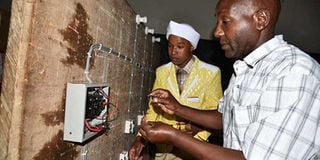Time for Kenya to be part of the TVET WorldSkills Competition

A tutor during a practical lesson at Mpeketoni Vocational Training Centre in Lamu. Kenya, though a leader in training and a beacon of innovation in the region over the years, will not be among the over 80 member states and associations participating in the 45th WorldSkills Competition. PHOTO | FILE | NATION MEDIA GROUP
What you need to know:
- The WSC is organised by WorldSkills International (WSI), a non-profit membership association.
- In Africa, South Africa, Namibia, Zambia, Egypt, Morocco and Tunisia are the only members of the WSC.
- Besides participating on the international stage, the countries have been organising their own national competitions.
In August, Russia will host in Kazan, the 45th WorldSkills Competition (WSC), a three-day contest aptly dubbed the “Skills Olympics”.
At the biannual event, people aged 25 and below meet to showcase their prowess in 46 skill areas and receive recognition at this pinnacle of excellence in vocational education and training.
Unfortunately, Kenya, though a leader in training and a beacon of innovation in the region over the years, will not be among the over 80 member states and associations participating.
VOCATIONAL EDUCATION
The WSC is organised by WorldSkills International (WSI), a non-profit membership association open to agencies or bodies with the responsibility of promoting vocational education and training in their respective countries or regions. The WSI was formed in 1950.
The competition, organised right from the grassroots before the winning teams ascend to the national and, finally, the global arena, is conceptualised to open the door to a world of opportunities to youth by affording them the space to try their hand at a skill. It also raises the awareness of technical and vocational training and skills among the young people, as well as their parents, teachers and employers, as their future really depends on an effective skills training system.
AFRICA
In Africa, South Africa, Namibia, Zambia, Egypt, Morocco and Tunisia are the only members of the WSC.
Besides participating on the international stage, the countries have been organising their own national competitions, where they sieve the cream to transit to the global arena. Other countries, such as the United Kingdom, have also embraced the competition under the umbrella of WorldSkills UK, a partnership between businesses, education and the government.
The competition brings together more than 80,000 young people from a diverse sectors such as engineering, construction, business, IT, hospitality and creative arts. The African Union has also partnered with WorldSkills to transform skills in the continent.
INAUGURAL SHOW
Last month, Rwanda — together with WorldSkills, Festo Didactic, the AU and the Lincoln Electric — organised a three-day competition to enhance hands-on skills and international exchange of technical skills TVET. Besides Rwandans, it brought together 2,000 youth from Ghana, Kenya, Liberia, Morocco and Uganda. But Kenya has not been left behind because, in January last year, we organised our inaugural three-day skills show, which was sponsored by the Technical and Vocational Education and Training Authority (TVETA) and other partners under the auspices of the Permanent Working Group (PWG) on TVET.
The next skills bonanza is slated for February 8-10 at Kenyatta International Conference Centre (KICC), Nairobi.
HUGE SUCCESS
The show and career event, dedicated to technical and vocational education and training institutions, has been a huge success that has offered youth and TVET institutions a platform to showcase their strides.
However, Kenya being a regional and continental stalwart in creativity and innovation, it is time we scaled up the gains and tested our mettle at the international stage.
The government has rightly positioned technical and vocational training as an enabler of the “Big Four” plan and the anchor of our development agenda. But we need to join the WSC, to give our youth another stage for self-realisation and a window to global opportunities.
The opportunities offered by the competition are immense for competitors, employers and industry, colleges, trainers and the country at large.
According to research by WorldSkills International, 25 percent of the competitors interviewed became self-employed after taking part in the skills competition. The majority indicated that they would not have started their businesses without the WorldSkills training.
These are some of the reasons why the TVET Authority plans to initiate steps for Kenya to join the WSC.
Dr Langat is the director-general/CEO, TVETA. [email protected]




